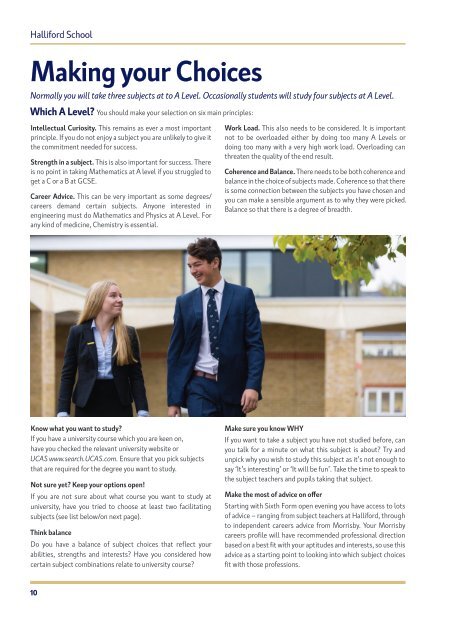SixthFormCourseGuide_1.8
Create successful ePaper yourself
Turn your PDF publications into a flip-book with our unique Google optimized e-Paper software.
Halliford School<br />
Making your Choices<br />
Normally you will take three subjects at to A Level. Occasionally students will study four subjects at A Level.<br />
Which A Level? You should make your selection on six main principles:<br />
Intellectual Curiosity. This remains as ever a most important<br />
principle. If you do not enjoy a subject you are unlikely to give it<br />
the commitment needed for success.<br />
Strength in a subject. This is also important for success. There<br />
is no point in taking Mathematics at A level if you struggled to<br />
get a C or a B at GCSE.<br />
Career Advice. This can be very important as some degrees/<br />
careers demand certain subjects. Anyone interested in<br />
engineering must do Mathematics and Physics at A Level. For<br />
any kind of medicine, Chemistry is essential.<br />
Work Load. This also needs to be considered. It is important<br />
not to be overloaded either by doing too many A Levels or<br />
doing too many with a very high work load. Overloading can<br />
threaten the quality of the end result.<br />
Coherence and Balance. There needs to be both coherence and<br />
balance in the choice of subjects made. Coherence so that there<br />
is some connection between the subjects you have chosen and<br />
you can make a sensible argument as to why they were picked.<br />
Balance so that there is a degree of breadth.<br />
Know what you want to study?<br />
If you have a university course which you are keen on,<br />
have you checked the relevant university website or<br />
UCAS www.search.UCAS.com. Ensure that you pick subjects<br />
that are required for the degree you want to study.<br />
Not sure yet? Keep your options open!<br />
If you are not sure about what course you want to study at<br />
university, have you tried to choose at least two facilitating<br />
subjects (see list below/on next page).<br />
Think balance<br />
Do you have a balance of subject choices that reflect your<br />
abilities, strengths and interests? Have you considered how<br />
certain subject combinations relate to university course?<br />
Make sure you know WHY<br />
If you want to take a subject you have not studied before, can<br />
you talk for a minute on what this subject is about? Try and<br />
unpick why you wish to study this subject as it’s not enough to<br />
say ‘It’s interesting’ or ‘It will be fun’. Take the time to speak to<br />
the subject teachers and pupils taking that subject.<br />
Make the most of advice on offer<br />
Starting with Sixth Form open evening you have access to lots<br />
of advice – ranging from subject teachers at Halliford, through<br />
to independent careers advice from Morrisby. Your Morrisby<br />
careers profile will have recommended professional direction<br />
based on a best fit with your aptitudes and interests, so use this<br />
advice as a starting point to looking into which subject choices<br />
fit with those professions.<br />
10




